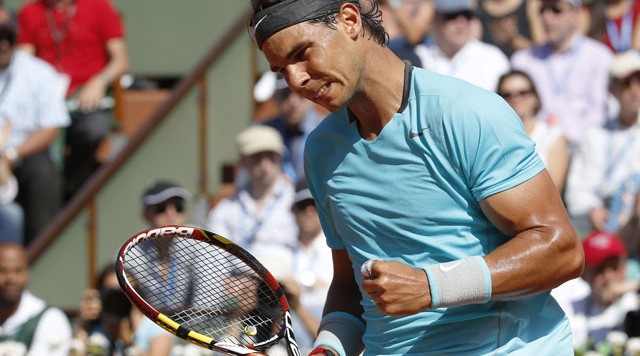In the Southwestern United States, Cox Communications has been running a series of commercials for a number of years. The point is rather simple: Cox guarantees its products in ways that competitors are prohibited from making certain statements:
This is what a lot of tennis journalists and commentators (though not all of them) are doing right now. They want to use terms that rhyme with “veneer hand tram” or “Sal’s gander land cram” to refer to Novak Djokovic’s pursuit of many forms of history at Roland Garros.
We all get it — of course we want to write about Djokovic’s attempt to give himself a much higher place in the tennis pantheon. However, his dance with destiny at the French Open is such a familiar one that it’s pointless to get too caught up in the… “howl-ender band gram” … until after the world No. 1 wins the darn thing.
In other words: Let’s slow down the hype train — or even keep it anchored in the train station — until this tournament is over. Should Djokovic win it, ALL ABOOOOOOOOOOOOOOOOOARD for SW19 and a Wimbledon that will crackle with particularly passionate intensity.
First things first, though: Djokovic has to tend to business in Paris.
*
In terms of filling in the final piece of the Grand Slam puzzle and solving Court Philippe Chatrier, Djokovic doesn’t need to reinvent the wheel in Paris. He just needs to keep his mind right… and maybe (maybe) receive a good draw.
Everyone knows the draw is more important than it has been in many years at Roland Garros — primarily because a Djokovic quarterfinal against Rafael Nadal is a possibility, but also because Tomas Berdych finds himself in the unusual position of being a top-four seed and therefore a desirable opponent to draw in the quarters. Kei Nishikori never seems to be fully healthy, but he’s healthier than he was a year ago at this time, and is therefore a player to be taken seriously. Where he lands in the draw is an important plot point.
This much is clear: There are so many possible cross-matches of players who find themselves in highly uncertain situations right now. Only Djokovic stands out as a player who can absorb a tough draw and transcend it. Even Nadal — the man with nine French Open titles to his credit — will probably need help from the fates on Friday, when the draw is released.
A quarter of the draw with Roger Federer or Tomas Berdych, and a half of the draw with the other man waiting in the semifinals, would give Nadal a strong chance of making the final, presumably against Djokovic. On the other hand, a quarter of the draw with Djokovic or Murray, and a half of the draw with the other main waiting in the semis, would make it exponentially more difficult for Nadal to score a perfect “10” in the City of Light. The greatest clay-court tennis player to have ever lived — either gender — could receive a reprieve (a Federer-and-Berdych half), a sentence of hard labor (a Djokovic-and-Murray half), or something in between (Berdych quarterfinal, Djokovic semifinal. How the other quarters of the draw fit into the larger picture would affect which players might get the opportunity to play a Roland Garros final with Nadal not on the other side of the net.
Naturally, if that’s Djokovic, the prospects of winning would be minimal, but this is where the focus comes back to the Serbian supernova, who has rocketed far past the rest of men’s tennis in 2015. As great as he currently is and has much as he’s achieved, Chatrier has been a stumbling block on repeated occasions.
Just consider the ways in which Djokovic has lost the past four years in Paris:
In 2011, carrying the weight of a 39-match winning streak into Paris, Djokovic — unaccustomed to playing with that much pressure — looked mentally fatigued in a semifinal loss to Roger Federer.
In 2012 and 2014, Djokovic double-faulted on match point to lose to Nadal in the final.
In 2013, Djokovic’s bizarre failure to avoid touching the net at a crucial juncture in the fifth set cost him in the semis against Rafa.
All four of Djokovic’s most recent French Open losses have not really been failures of his groundstrokes or tactics so much as failures of nerve. This is the tournament that has eluded him and his glorious skills for so long. Being human like the rest of us, Djokovic has absorbed and internalized the pressure associated with trying to chase down this one glittering goal, the one that would make his career complete. The coming fortnight is one in which Novak Djokovic — regardless of his draw (though no Rafa in the quarters would certainly help) — should stand above everyone else.
The person he’ll ultimately need to subdue more than anyone, including Nadal?
His name is Novak Djokovic.

